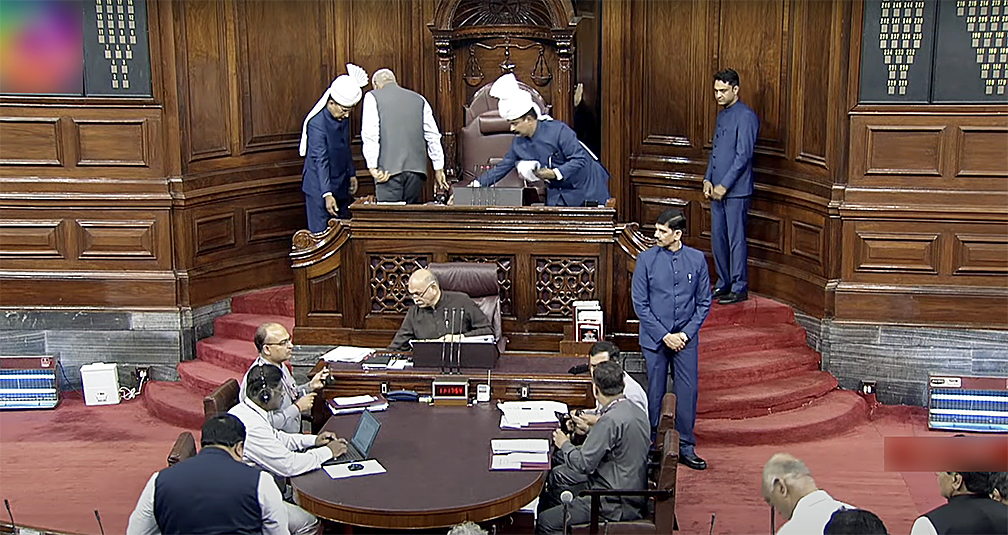NEW DELHI: Amidst continued protests by both Treasury benches and Opposition members in Parliament and adjournment of the Houses with no business being transacted, the fate of a few pending Finance and Industry Bills remains uncertain.
One of the key legislations which is held up is the Competition Amendment Bill 2022 under the Ministry of Finance which seeks to amend the Competition Act, 2002, to regulate mergers and acquisitions based on the value of transactions. If the Bill gets approved, deals with transaction value of more than Rs 2,000 crore will require the approval of the Competition Commission of India. The Bill proposes to reduce the timeline for the CCI to pass an order on such transactions from 210 days to 150 days.
The proposed legislation was introduced on 5 August 2022 in the Lok Sabha and was referred to the Standing Committee on Finance on 17 August 2022 which submitted its report on the Competition (Amendment) Bill, 2022, on 13 December 2022. The Bill was listed under the private members’ business on the Lok Sabha website and scheduled to be introduced on 17 March by BJP MP Jayant Sinha, who is also Chairperson for the Standing Committee on Finance. The Competition (Amendment) Bill, 2022 was introduced after reviewing the recommendations proposed by the Competition Law Review Committee, which was constituted in 2018 by the Ministry of Corporate Affairs to ensure that the Competition Act was in line with India’s economic fundamentals.
There have been significant changes in the economic and business landscape since the Act came into force, with the idea of promoting and sustain competition in markets, protect the interest of consumers and ensure freedom of trade for market participants. Indian markets have grown significantly and there has also been changes in the way businesses operate with the emergence of digital internet based companies and new age markets involving technology. One of the changes the Amendment Bill seeks is to expand the scope of entities that can be adjudged to be a part of anti-competitive agreements. Currently, enterprises or persons engaged in similar businesses can be held to be a part of anti-competitive agreements.
The Bill expands this to also include enterprises or persons who are not engaged in similar businesses and provides a framework for settlement and commitment for faster resolution of investigations of anti-competitive agreements and abuse of dominant position. As a measure towards the ease of doing business, the Bill decriminalises certain offences under the Act by changing the nature of punishment from imposition of fine to civil penalties. These offences include failure to comply with orders of the CCI and directions of the director general related to anti-competitive agreements and abuse of dominant position.
Another important legislation in the line-up is the Jan Vishwas (Amendment of Provisions) Bill, 2022 under the Ministry of Commerce and Industry, which was introduced in Lok Sabha on 22 December 2022 and then referred to the Joint Parliamentary Committee in December 2022. The Bill amends 42 Acts to reduce the compliance burden on individuals and businesses and ensure ease of doing business. Some of the laws that are amended by the Bill include the Indian Post Office Act, 1898, the Environment (Protection) Act, 1986, the Public Liability Insurance Act, 1991 and the Information Technology Act, 2000.
If the Bill goes through, what it will do in effect is decriminalise certain offences with an imprisonment term by imposing only a monetary penalty. For example, under the Agricultural Produce (Grading and Marking) Act, 1937, counterfeiting grade designation marks is punishable with imprisonment of up to three years and a fine of up to Rs 5,000. The Bill replaces this with a penalty of Rs 8 lakh. Grade designation mark indicates the quality of an article under the 1937 Act.
Under the IT Act, 2000, disclosing personal information in breach of a lawful contract is punishable with imprisonment of up to three years, or a fine of up to Rs 5 lakh, or both. The Bill replaces this with a penalty of up to Rs 25 lakh. Under the Patents Act, 1970, a person selling a falsely represented article as patented in India is subject to a fine of up to Rs 1 lakh. The Bill replaces the fine with a penalty, which may be up to Rs 10 lakh. In case of a continuing claim, there shall be an additional penalty of Rs 1,000 per day.
‘Competition Amendment’ among key Bills held up in Parliament
- Advertisement -

